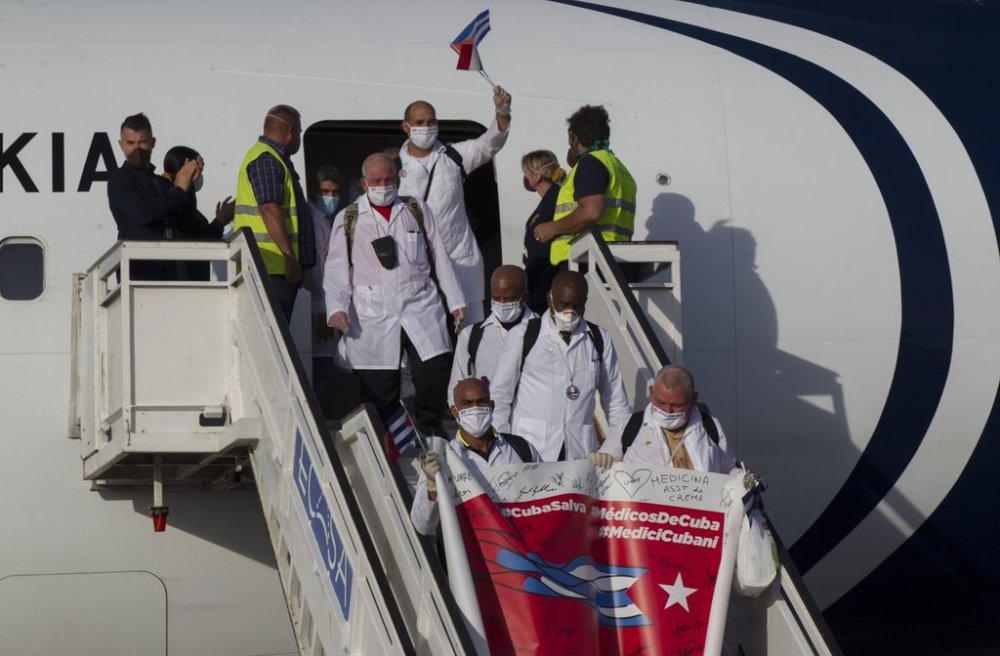Caribbean leaders oppose US policy targeting Cuban medical missions, saying they’re critical
Advertisement
Read this article for free:
or
Already have an account? Log in here »
To continue reading, please subscribe:
Monthly Digital Subscription
$1 per week for 24 weeks*
- Enjoy unlimited reading on winnipegfreepress.com
- Read the E-Edition, our digital replica newspaper
- Access News Break, our award-winning app
- Play interactive puzzles
*Billed as $4.00 plus GST every four weeks. After 24 weeks, price increases to the regular rate of $19.95 plus GST every four weeks. Offer available to new and qualified returning subscribers only. Cancel any time.
Monthly Digital Subscription
$4.99/week*
- Enjoy unlimited reading on winnipegfreepress.com
- Read the E-Edition, our digital replica newspaper
- Access News Break, our award-winning app
- Play interactive puzzles
*Billed as $19.95 plus GST every four weeks. Cancel any time.
To continue reading, please subscribe:
Add Free Press access to your Brandon Sun subscription for only an additional
$1 for the first 4 weeks*
*Your next subscription payment will increase by $1.00 and you will be charged $16.99 plus GST for four weeks. After four weeks, your payment will increase to $23.99 plus GST every four weeks.
Read unlimited articles for free today:
or
Already have an account? Log in here »
Hey there, time traveller!
This article was published 11/03/2025 (311 days ago), so information in it may no longer be current.
GEORGETOWN, Guyana (AP) — Caribbean leaders are pushing back against a new U.S. policy that aims to crack down on Cuban medical missions, saying that the work of hundreds of Cuban medical staff across the region is essential.
Hugh Todd, Guyana’s foreign minister, told The Associated Press on Tuesday that foreign ministers from a 15-member Caribbean trade bloc known as Caricom recently met with U.S. Special Envoy for Latin America Mauricio Claver-Carone in Washington, D.C. after the U.S. threatened to restrict the visas of those involved with Cuban missions, which U.S. Secretary of State Marco Rubio has called “forced labor.”
“The U.S. is a strategic partner to Caricom, but this very important issue has to be dealt with at the level of heads of government,” Todd said.

Overall, Cuba has some 24,180 doctors working in 56 nations, with the missions boosting health care across the Caribbean, especially in impoverished nations with limited medical services.
“Their presence here is of importance to our health care system,” Kamina Johnson Smith, Jamaica’s foreign minister, said at a press briefing last week, noting the island has more than 400 Cuban doctors, nurses, biomedical engineers and technicians.
At least two influential Caribbean leaders, the prime ministers of Trinidad and Tobago and of St. Vincent and the Grenadines, have publicly rallied against the new policy and said they would gladly forgo their U.S. visas.
“I will prefer to lose my visa than to have 60 poor and working people die,” said St. Vincent Prime Minister Ralph Gonsalves.
He said Cuban doctors are providing critical care to patients including 60 who receive dialysis treatment.
“I will not be able to offer that service,” he told reporters during a recent official trip to Jamaica.
Meanwhile, Trinidad Prime Minister Keith Rowley told reporters Monday that he wouldn’t mind losing his U.S. visa either.
“I just came back from California, and if I never go back there again in my life, I will ensure that the sovereignty of Trinidad and Tobago is known to its people and respected by all,” he said at a recent public event where the crowd clapped, according to the Daily Express, a local newspaper. “We rely heavily on health care specialists whom we have obtained from India, the Philippines, and mainly from Cuba over the decades.”
Rowley said those medical professionals are paid the same as local ones, “but we’re now being accused of taking part in the program where people are being exploited. That is someone’s interpretation.”
Last month, Bruno Rodríguez, Cuba’s foreign minister, accused Rubio of putting his “personal agenda” ahead of U.S. interests and called the move an “unjustified aggressive measure.”
____
Follow AP’s coverage of Latin America and the Caribbean at https://apnews.com/hub/latin-america

